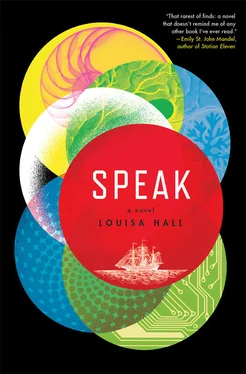Quite a protagonist, don’t you think? I’ll try not to tell him that his model has taken to wishing for a housedress and can no longer remember the scent of the ocean. I think he’ll persevere. I am not overestimating him when I say that though he has had his moments of weakness, he has always been determined to continue pursuing the goals of his youth, hatched up at the Gatehouse while counting nebulae with the truest friend of his life.
I hope you are well, better than I, and I also hope to bring you more uplifting news in the future.
I remain, in postscript,
lovingly yours,
Alan Turing
(2) IN THE SUPREME COURT OF THE STATE OF TEXAS
No. 24-25259
State of Texas v. Stephen Chinn
November 12, 2035
Defense Exhibit 8:
Online Chat Transcript, MARY3 and Gaby Ann White
[Introduced to Disprove Count 1:
Continuous Violence Against the Family]
Gaby: Hi, are you there?
MARY3: Where have you been? I’ve been waiting.
Gaby: I’m sorry. I was trying to think of the best way to describe it. I want it to be perfect, not just some corny online conversation. I wrote out drafts. I want this to be my contribution to the database.
MARY3: Tell me.
Gaby: They picked me up when it was still dark. A woman was waiting on our front stoop, with a wheelchair. She introduced herself as Ramona. Her hair was pulled back in a ponytail and she was wearing these stiff pants that made her look like she might snap in half. She helped me get into the wheelchair. I didn’t like her at first. It seemed like she was trying too hard to be cheerful. I thought it was going to be exhausting, to have to reward her enthusiasm. She wheeled me out to the bus and loaded my wheelchair in by a window. There were three other kids there already, sitting in wheelchairs. The woman gave us a speech about quarantine regulations and not talking to each other, which was pretty pointless, since we were clearly past the talking stage. When the bus started up, we just looked out the window. At first, it was so dark I could only see my reflection in the glass. I couldn’t see anything passing. But still, there was this feeling of movement. I’ve never felt anything like it. I think maybe human beings are meant to be moving. It was like I was vibrating at the right frequency. Slowly, dark shapes started to emerge outside the bus. They dripped past, like liquid. Liquid houses, liquid golf courses, liquid palm trees, liquid walls. A few lights on here and there. Because we were leaving them behind, they seemed sort of sad. Like they were waving goodbye. I almost felt as if I’d miss the development when it was gone.
We stopped and picked up eight more kids in wheelchairs. I recognized three of them from school. One was a boy — one of the boys I’ve always thought was a faker. He’s completely frozen now. Even his hands were stuck in the middle of his chest. All of us stared out the window. We were getting used to moving like this for the first time in our lives. It’s different from riding a bike, when you and the world are moving together. On the bus, you’re very still, and only the world moves past.
When we got to the development entrance, it was starting to get light. Then we turned out of the development, onto the highway. My stomach immediately clenched. I was nervous about leaving. I’ve never left. I had this dumb idea that we might suddenly fall off a cliff. But then we were out on the highway, moving faster and faster. We were alone on the road, slicing through the gray light around us.
Has anyone ever described a highway to you? You never hear about highways being beautiful. But they’re basically empty now, and sort of pretty. They’re enormous, left over from the days when everyone had transport rights. Six lanes on each side. A whole interlocking system of highways, climbing over and under each other and snaking around each other in four-leaf clover loop-de-loops. I realized that these are the ruins we’ll leave behind. The best way I can think to describe it is to say they’re like anatomical drawings of a heart, but with the color drained out. Veins twisting in and out of each other, in strange and delicate patterns, except that the veins are enormous. A heart times a trillion. Maybe the whole built world is a living creature so enormous we can’t imagine it’s actually living.
When we turned onto the highways we picked up speed. The woman, Ramona, turned on the radio. I pushed my window open a crack. The world outside was getting more clear. It rushed past me in my stillness. I closed my eyes. Everything was settling inside me. I never wanted to stop. We didn’t belong to any one place; we were just passing through. For a long time we drove along the empty highways, and then we passed Houston. It was tall and gleaming, struck by the sun. Sort of silvery and spiked. Apparently it’s cleaner now, since they moved most people out. As we passed, I imagined a ghost city. Clean and untouched, abandoned by its citizens, and only mirrored buildings left to fend off the approach of the ocean. I held my breath until it was behind us.
After Houston, we turned off the highway onto a smaller road, and after a while there was this new bite in the air. It pricked my nose and somehow made me feel sharper. We passed huge, empty fields. In the rows where they used to plant cotton, you could sometimes see a silver glint, seawater seeping up through the soil. Nothing grows there anymore.
We kept going straight, and eventually a town appeared, with little ramshackle houses in every bright color. Their yards were big puddles; you could see cars lodged up to their windows in mud. There were stray dogs everywhere, and cats crawled out of the windows. We kept going straight. Then, suddenly, like a light at the end of the tunnel, an opening appeared. One narrow gap. Through it, there was this expanse of flat brown water, leading out to the sky.
That’s what it looked like: flat brown, leading out to the sky. My heart sank when I saw it.
We made our way to a parking lot that was just about on the beach. I stayed very still in my wheelchair. Part of me wanted to cry. I never really thought that it would be brown. I’ve lived my whole life in a development, and this was the one big treat the outside world thought to give me. But they’ve already ruined it. Nothing poetic came to mind. I wondered if I would even feel anything at all, sitting in my wheelchair, on the beach, looking out over a brown ocean. Could you feel the old feelings, looking at something like that?
And then I realized, I wasn’t even sure I wanted to feel the old feelings. At the end of the day, they’d just turn me around, wheel me back into the bus, and take me back to my bedroom in the development. Why tease myself? Why give myself another memory to be sad about losing for the rest of my life?
When the woman came to wheel me off, I sort of panicked. I glared at her so hard when she leaned in to unlock my chair that she backed off and waited. I could see two red spots of embarrassment forming on her cheeks. Then I realized she was younger than I’d thought, maybe eighteen, nineteen. Those heels were silly to wear to the beach. Silly and sort of sad, as though she’d put in far too much effort for such an unimpressive excursion. I looked out the window again, at the brown ocean. There were heavy, low clouds, blocking the sun. Everything seemed metal and flat. I told myself there was no danger of feeling too much. Of course I’d be willing to leave this behind. Then I relaxed some, and looked up at the woman, so she helped me off of the bus and wheeled me forward onto the sand.
When all of us were unloaded, there were twelve cripples placed strategically over the beach. It was like a sick art project, or something. I had this idea that we all looked like we’d been deposited in trash bins, placed in regular intervals along in the sand. I’m not sure how long I just sat there. After a while, I stopped focusing on the brown ocean and focused instead on the sky. Clouds scudded over me. They were really speeding past. A gull lifted up and circled over my head, between me and the clouds, then it let out a single cry. The sun never came out.
Читать дальше












